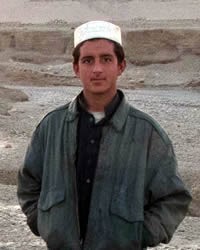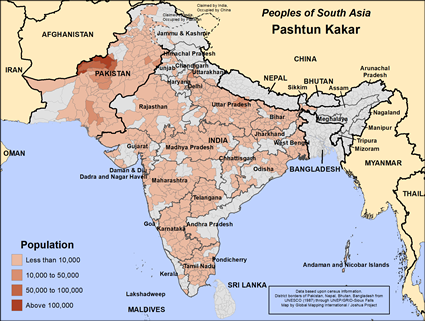The Pashtun are probably the largest tribal people in the world. The Kakar are a sub-group of the Pashtun, and they mostly live in west central Pakistan near the Afghan border. A smaller group have migrated to India. Pashtun are called Pathan in India. Pashtun are the second largest ethnic group in Pakistan. Arab-funded madrassas (religious schools) throughout Pakistan, became the seedbed for the rise of the Taliban movement. Driven by a combination of religious zeal and Pashtun nationalism, and fueled by Arab money, the "Taliban" (a term for "religious students") imposed a harsh, hyper-conservative (Wahhabi) version of Islam on Afghanistan. Instability, endemic corruption, and on-going violence have led to widespread disillusionment—and the migration of tens of thousands of Pashtuns seeking jobs and opportunities outside of their homeland. The Kakar speak Southern Pashto, one of the two major Pashtun languages. Pashtun people in India usually speak Urdu as their first language.
A Pashtun's primary loyalty is to his particular social group (tribe or sub-tribe). Kakars are sons of Gharghashti who was either the son or grandson of Qais Abdul Rashid, the legendary patriarch of the Pashtun. Pashtuns share a common descent; the Islamic religion; the Pashtunwali Code of Honor; and to some extent, language (Pashto). The greatest evil for the Pashtun is to bring shame upon one's family, clan or tribe. The Pashtun, especially the rural ones, live and die based on their code of honor. Tens of thousands of Pashtuns have departed from Pakistan seeking a better life in Europe, the Persian Gulf nations and the West. Many Kakar have moved to urban areas and taken up jobs in construction, factories, the oil industry, and retail. The traditional occupations of the Pashtun in Pakistan are agriculture and animal husbandry. One could almost say that a third profession of the Pashtun is warfare. They have been fighting outsiders and among themselves for centuries. Every Pashtun man considers himself a warrior. The life of a Pashtun woman depends upon where she lives. In the countryside, women follow the traditional role of being a wife and caretaker for her children. In cities, women are more likely to obtain an education and work outside of the home. A man may have up to four wives in Islam if he can afford them. Most men marry only one wife. Young people marry within their clan. Children, especially boys, are seen as a blessing from Allah.
The Pashtun Kakar are Sunni Muslims, the largest branch of Islam. Being a Muslim is viewed an essential part of the Kakar's identity. Kakar try to obey the teachings of the Koran and the prophet Mohammad. Sunnis believe that by following the Five Pillars of Islam that they will attain heaven when they die. Allah, the supreme God of the universe, determines who enters paradise. Sunnis pray five times a day facing Mecca. They fast the month of Ramadan. They attend mosque services on Friday. If a Muslim has the means, he or she will make a pilgrimage to Mecca once in his or her lifetime. Muslims are also prohibited from drinking alcohol, eating pork, gambling, stealing, using deceit, slandering, and making idols. If a Kakar becomes a follower of Jesus Christ, he or she will face persecution from his or her family and tribe. The two main holidays for Sunni Muslims are Eid al Fitr, the breaking of the monthly fast and Eid al Adha, the celebration of Abraham's willingness to sacrifice his son to Allah.
The Kakar need to hear and understand the life-saving message of Jesus Christ. He alone can forgive their sins and grant them eternal life. Rural Kakar Pashtun have an oral culture. Most rural women and many men are unable to read and write. These people would benefit from better access to modern medicine and education.
Pray for wide availability for Southern Pashto language radio programs. Pray that Kakar families will be led to listen to these programs. Pray for an openness to the gospel among Kakar elders and leaders. Ask the Lord to raise up a church planting movement among the Pashtun Kakar in Pakistan in this decade.
Scripture Prayers for the Pashtun Kakar in Pakistan.
| Profile Source: Joshua Project |











